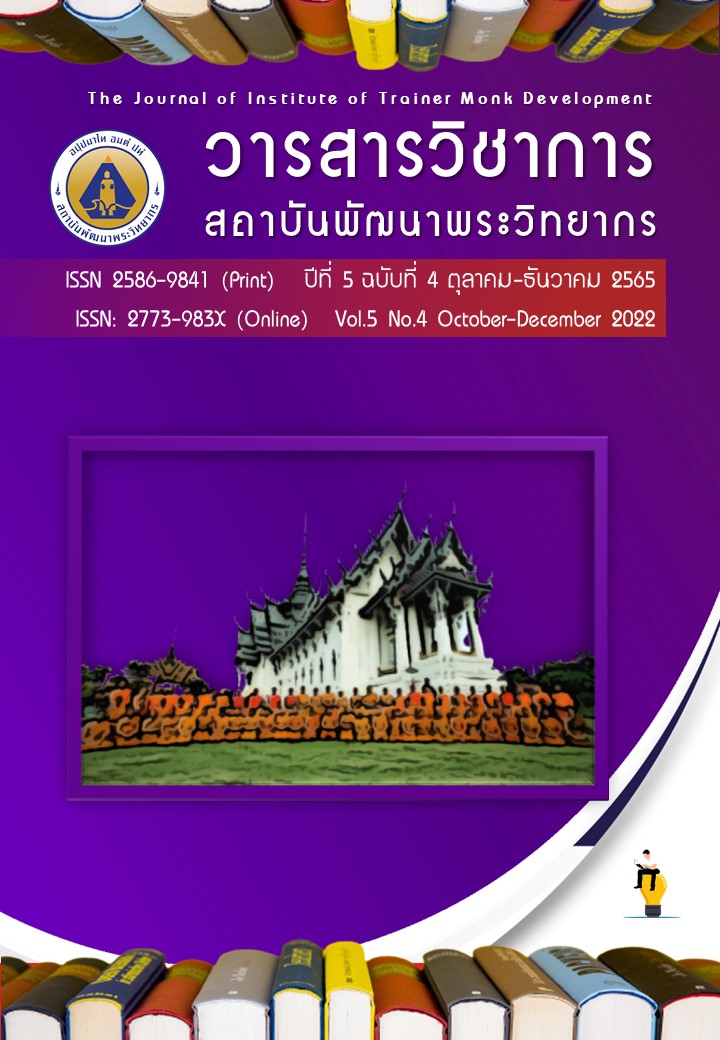Development of Quality of Life in Multicultural Society with the Ten Principles
Main Article Content
Abstract
This article has the purpose of study. 10 Principles of Nathakarana Dharmma to improve the quality of life, were found to be practice for improving the quality of life in naming. That are important according to the teaching of the Buddha, that want Buddhists to practice themselves to have precepts, knowledge, have friends and teachers to recommend good thing, being a simple and reasonable ruler, willingly assist in the work of the group, study the Dharmma in great depth ascend with perseverance. Satisfied with what he earned with purity, Be mindful of doing the words spoken and develop wisdom to understand the state of things as the really have quality in multicultural society above the standard to another level called civilized people.
Article Details

This work is licensed under a Creative Commons Attribution-NonCommercial-NoDerivatives 4.0 International License.
บทความที่ได้รับการตีพิมพ์เป็นลิขสิทธิ์ของวารสารวิชาการสถาบันพัฒนาพระวิทยากร
ข้อความที่ปรากฎอยู่ในบทความที่ได้รับการตีพิมพ์ในวารสาร ถือเป็นความรับผิดชอบของผู้เขียนบทความ และข้อคิดเห็นนั้นไม่ถือว่าเป็นทัศนะและความรับผิดชอบของกองบรรณาธิการวารสารวิชาการสถาบันพัฒนาพระวิทยากร
References
พระพรหมคุณาภรณ์ (ป.อ. ปยุตฺโต). (2543). พจนานุกรมพุทธศาสน์ ฉบับประมวลศัพท์. พิมพ์ครั้งที่ 9. กรุงเทพมหานคร: โรงพิมพ์มหาจุฬาลงกรณราชวิทยาลัย.
มหาจุฬาลงกรณราชวิทยาลัย. (2539). พระไตรปิฎกภาษาไทย ฉบับมหาจุฬาลงกรณราชวิทยาลัย. กรุงเทพมหานคร: โรงพิมพ์มหาจุฬาลงกรณราชวิทยาลัย.
สมเด็จพระสังฆราช สกลมหาสังฆปริณายก. (2561). โลกและชีวิตในพุทธธรรม ชีวิตนี้น้อยนัก แต่ชีวิตนี้สำคัญนัก. จังหวัดสมุทรสาคร: บริษัท พิมพ์ดี จำกัด.
จำนงค์ ทองประเสริฐ. (2548). ศาสนาเปรียบเทียบระหว่าพระพุทธศาสนาและคริสต์ศาสนา. กรุงเทพมหานคร :บริษัท สหธรรมิกจำกัด.
นิรันดร์ จงวุฒิเวศน์. (2550). กถาพัฒนากร กรมการพัฒนาชุมชน. กรุงเทพมหานคร: บริษัท รำไทยเพรส จำกัด.
Judith Blau and Alberto Moncada. (2009). “Sociological Theory and Human Rights: Two Logics, One World”. the new blackwell companion to Social Theory. edited by bryan s. turner, (Oxford: Blackwell Publishing Ltd.


